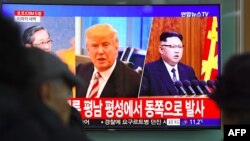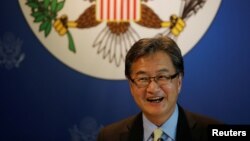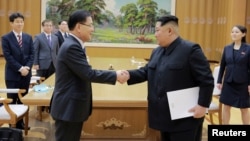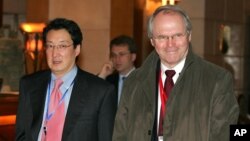President Donald Trump reacted positively to an unexpected willingness from North Korea to conduct talks on freezing its nuclear program, but some analysts are cautioning that the Trump administration does not have the experts in place needed to prepare and conduct such difficult negotiations.
A number of former U.S. ambassadors and senior advisers have also welcomed the unexpected North Korean overture, as relayed by South Korea, and said they would advise the Trump administration to “proceed with caution” to see if Pyongyang is sincere.
State Department spokesperson Heather Nauert said the U.S. is in close contact with its South Korean ally and looks forward to learning more about the North Korean offer when South Korean officials come to Washington later this week to brief U.S. officials on their historic visit to Pyongyang.
Several qualified negotiators
At Tuesday’s State Department briefing, reporters pointed out that the most obvious person to lead a U.S. team to prepare for possible direct talks with Pyongyang would have been recent retiree Joseph Yun, the veteran U.S. diplomat in charge of North Korea policy. Nauert rejected concerns that there is a void in leadership.
“We have plenty of people who are more than qualified to have these types of conversations with the White House and also the Republic of Korea, our ally,” she said.
Nauert mentioned Susan Thornton, who is the State Department’s nominee for assistant secretary for East Asian and Pacific affairs who is acting in that position but has yet to be confirmed.
Nauert also mentioned Mark Lambert, director for Korea policy at the State Department, and Marc Knapper, chargé d’affaires at the U.S. Embassy in Seoul.
The U.S. still does not have an ambassador to South Korea.
Opportunity too valuable to waste
Aaron David Miller, a senior analyst at the Wilson Center, has advised a number of Republican and Democratic secretaries of state.
Miller told VOA he believes if this recent offer of direct talks does represent a transformative change in North Korean leader Kim Jong Un’s position, then it is too valuable an opportunity to waste, and the U.S. should test it — first through discreet dialogue before any structured negotiations take place.
Asked who in the Trump administration could prepare and conduct sensitive, complicated and grueling direct talks with North Korea, Miller drew a blank.
“Right now, it is hard to identify any single individual or team of individuals that has both the negotiating experience and knowledge of the history, the cultural and political sensitivity, and knowledge of how the North Koreans behave and how they see the world,” he said.
He added: “In this republic, you might have to reach for people who have had experience and who are part of another administration. This administration may not be willing to do that.”
Miller said if this offer of talks becomes serious, it would mean months, if not years, of negotiations. He said the president has created some “running room” for diplomacy, and that all sides are in a better position than they were before.
Christopher Hill, former U.S. ambassador and senior U.S. negotiator with North Korea, agreed that this is a rare diplomatic opening.
On Tuesday, Hill tweeted: “A goal of cutting or curbing #NorthKorea nukes is not the same as eliminating those weapons, but the US should still pursue and see whether apparent offer can be a realistic starting point for total elimination.”
“After decades of frustrating negotiations with North Korea, the U.S. must resist the temptation to do nothing, because the threat will never go away on its own,” he said.







